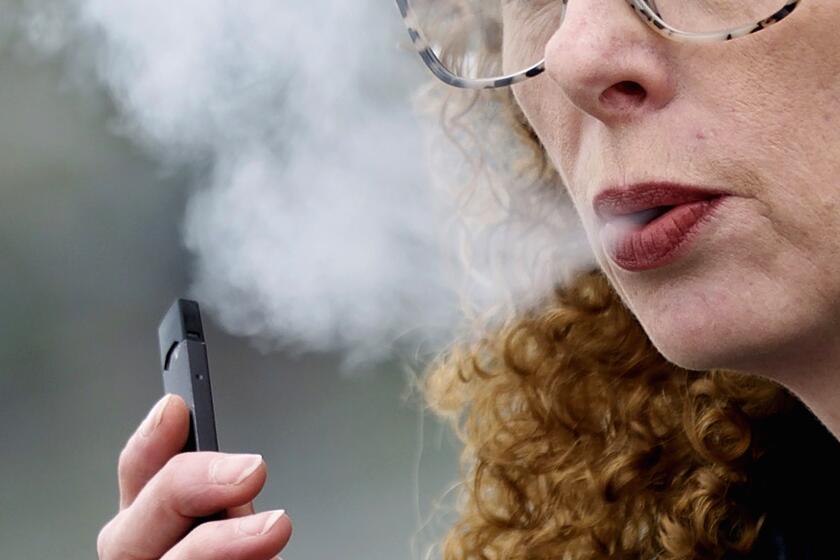Sweden is close to becoming Europe’s first ‘smoke-free’ country as cigarette use drops

STOCKHOLM — Summer is in the air, but cigarette smoke is not in Sweden’s outdoor bars and restaurants.
As the World Health Organization marked World No Tobacco Day on Wednesday, Sweden, which has the lowest rate of smoking in the European Union, is close to declaring itself “smoke free” — defined as having fewer than 5% daily smokers in the population.
Many experts give credit to decades of anti-smoking campaigns and legislation, while others point to the prevalence of “snus,” a smokeless tobacco product that is banned elsewhere in the EU but is marketed in Sweden as an alternative to cigarettes.
Whatever the reason, the 5% milestone is now within reach. Only 6.4% of Swedes older than 15 were daily smokers in 2019, the lowest in the EU and far below the average of 18.5% across the 27-nation bloc, according to the Eurostat statistics agency.
Figures from the Public Health Agency of Sweden show the smoking rate has continued to fall since then, reaching 5.6% last year.
“We like a healthy way to live, I think that’s the reason,” said Carina Astorsson, a Stockholm resident. Smoking never interested her because “I don’t like the smell; I want to take care of my body.”
U.S. adults are smoking less. Cigarette smoking dropped to another new all-time low last year, but e-cigarette use rose, to about 1 in 17 adults.
The risks of smoking appear well understood among health-conscious Swedes, including younger generations. Twenty years ago, almost 20% of the population were smokers — which was a low rate globally at the time. Since then, measures to discourage smoking have brought down smoking rates across Europe, including bans on smoking in restaurants.
France saw record drops in smoking rates from 2014 to 2019, but that success hit a plateau during the height of the COVID-19 pandemic — blamed in part for causing stresses that drove people to light up. About one-third of people ages 18 to 75 in France professed to having smoked in 2021 — a slight increase from 2019. About a quarter smoke daily.
Sweden has gone further than most to stamp out cigarettes and says it’s resulted in a range of health benefits, including a relatively low rate of lung cancer.
“We were early in restricting smoking in public spaces, first in school playgrounds and after-school centers, and later in restaurants, outdoor cafes and public places such as bus stations,” said Ulrika Arehed, secretary-general of the Swedish Cancer Society. “In parallel, taxes on cigarettes and strict restrictions on the marketing of these products have played an important role.”
Philip Morris International America CEO Martin King on how the cigarette giant is preparing for a future when no one smokes.
She added that “Sweden is not there yet,” noting that the proportion of smokers is higher in disadvantaged socioeconomic groups.
The sight of people lighting up is becoming increasingly rare in this country of 10.5 million. Smoking is prohibited at bus stops and train platforms and outside the entrances of hospitals and other public buildings. As in most of Europe, smoking isn’t allowed in bars and restaurants, but since 2019, Sweden’s smoking ban also applies to their outdoor seating areas.
Swedish snus makers have long held up their product as a less harmful alternative to smoking and claim credit for the country’s declining smoking rates. But health authorities are reluctant to advise smokers to switch to snus, a highly addictive nicotine product.
“I don’t see any reason to put two harmful products up against each other,” Arehed said. “It is true that smoking is more harmful than most things you can do, including snus. But that said, there are many health risks even with snus.”
Some studies have linked snus to increased risk of heart disease, diabetes and premature births if used during pregnancy.
Swedes are so fond of their snus, a distant cousin of dipping tobacco in the United States, that they demanded an exemption to the EU’s ban on smokeless tobacco when they joined the bloc in 1995.
Tove Marina Sohlberg, a researcher at Stockholm University’s Department of Public Health Sciences, said Sweden’s anti-smoking policies have had the effect of stigmatizing smoking and smokers, pushing them away from public spaces into backyards and designated smoking areas.
“We are sending signals to the smokers that this is not accepted by society,” she said.
The FDA’s order for Juul to pull its e-cigarettes from the U.S. market is part of an effort to bring scientific scrutiny to the multibillion-dollar vaping industry.
Paul Monja, one of Stockholm’s few remaining smokers, reflected on his habit while getting ready to light up.
“It’s an addiction, one that I aim to stop at some point,” he said. “Maybe not today, perhaps tomorrow.”
More to Read
Sign up for Essential California
The most important California stories and recommendations in your inbox every morning.
You may occasionally receive promotional content from the Los Angeles Times.













